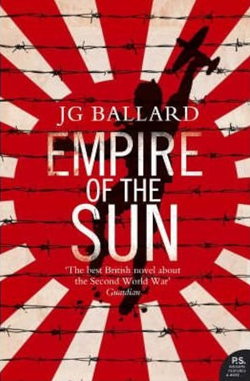I touched on JG Ballard four years ago, but he has come to our attention again as it is now 40 years since the publication of his autobiographical novel Empire of the Sun. By the time that novel was published in 1984, Ballard had been a novelist for over twenty years, gaining recognition particularly in the science fiction world, but without any of the massive acclaim that came with his novel about internment in a Japanese camp in Shanghai during the Second World War.
 Childhood Experiences
Childhood Experiences
Empire of the Sun became an international best seller and won Ballard the Guardian Fiction Prize and the James Tait Black Memorial Prize as well as a Booker nomination. Spielberg’s film adaptation a few years later was equally successful and brought the novel further attention. It featured a young Christian Bale as Jim, the fictionalised version of Ballard himself, in a performance which Ballard admired. John Malkovich is a striking presence in the film too, as one of a pair of American ne’er-do-wells who befriend Jim.
Such a realist, autobiographical novel may seem an enormous departure from Ballard’s earlier work, embracing a different style of fiction altogether. Yet as this excellent celebratory article by John Gray points out, it’s not quite as much a shift as it may seem. Much of Ballard’s work has been about change and about how humankind responds to those changes. Empire of the Sun examines the historical cataclysm of the Japanese invasion of China in WW2, rather than the imagined world-ending changes of his previous novels. The ex-pat population enjoying the privileged playground of Shanghai was transported to a camp which stripped them not only of privilege, but of dignity.
Ballardian Vision
Doubtless the young Ballard’s experience of this, with its cruelty and barbarity, affected his worldview and fiction in his later life. How we remember, and use our memories in creating our lives is crucial in Ballard’s work. As John Gray says:
Human memory is a constant reprocessing of our lives. As the world keeps on unmaking us, we remake ourselves or our lives are spent in forgetting…
If Ballard’s work has a message, it is that rather than banishing from our minds the chaos that regularly engulfs us, we are better off accepting and learning to find meaning in it.
That view of how human beings react to the continuing changes around them, whether swift and brutal or gradual shifts, like the development of technology, informs Ballard’s work so much that it has coined the adjective ‘Ballardian’, denoting a rather bleak dystopian understanding of a modern world of man-made landscapes and enthralling technology. One of this short stories, ‘Billennium’, is a good example – here’s a short piece on this website about it.
 Crash
Crash
Perhaps Ballard’s most controversial work is Crash, which explores the erotic attraction of motor vehicle accidents. Ballard himself called it the first ‘pornographic novel about technology’ and it is certainly an uncomfortable read. It too was made into a film, by David Cronenberg, which while it did not meet universal acclaim from film critics, became the focus of newspaper campaigns in Britain to ban it.
Yet it implicitly responds to the ways in which cars have been marketed and advertised using sexual suggestions, the association of driving and speed with machismo and the general fetishising of the car in society. The novelist Zadie Smith, admitting that she was appalled by the novel as a student, now sees it in a very different light, as she writes here. She also wrote the introduction to a reissue of the novel.
Good or Brilliant?
Tom McCarthy, in this article, observes that students sometimes find Ballard’s writing almost mechanistic, highly patterned and lacking developed psychology of their characters. This, he argues, is what makes Ballard brilliant – he has adapted his own writing style to reflect the machine and algorithm-directed way in which he sees humanity developing. In this way, he says,
Ballard’s novels are radical in the true sense, in that they reach back to and reanimate the novel’s very roots.
 Influence
Influence
Much of Ballard’s work is strangely prescient. He was writing about rising sea levels and flooding as a result of climate change in the 1960s (The Drowned World) and in some ways Crash prefigures the ghoulish fascination with the death of Diana Princess of Wales. He’s looked at gated, closed communities that shelter themselves from the real world, with disastrous consequences (Super-Cannes).
It is his breadth of vision, his interest in how technology is shaping the development of humankind, that has ensured that Ballard’s influence has been wide, not only on fellow writers, but on film makers, musicians, architects and TV makers, as this article explores.
Further Reading
The British Council site’s Ballard page.